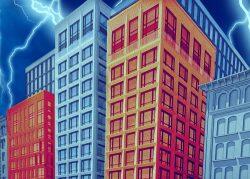Hundreds of affordable housing units
are set to be built at the site of a large Christian church in central San Jose.
Mayor Sam Liccardo announced plans for the development in the parking lot of Cathedral of Faith at 2315 Canoas Garden Avenue. The project will feature 237 apartments across two buildings on a 13.4-acre parcel. It will serve roughly 78 seniors, as well as 159 unhoused people, adults with disabilities and young people coming out of the foster care system.
The developer, Palo Alto-based Sand Hill Property company, is also planning supportive services and programs to help address mental health and substance use issues. Sand Hill estimates the project will cost $800,000 per unit.
Plans will go before the City Council in January for final approval, with construction expected to start sometime in 2023.
“We hear very often from our unhoused residents and many families who are struggling paycheck to paycheck to build more affordable housing,” Liccardo said at a news conference. “Occasionally we will hear, ‘not in my backyard,’ or NIMBY. But NIMBY is increasingly being replaced by something more inspiring. In this case, we call it YIGBY: ”Yes in God’s backyard.’”
The church, its charter school and a day-care center will not be affected by the development. Ken Foreman, senior pastor, envisions the church campus as a village.
“We are so excited about doing what we can to help, and we’ve always had a heart to serve our city,” Foreman said. “This affordable housing really is the next step to serve families and seniors and vulnerable populations.”
Local and state leaders see houses of worship as a partner in addressing the state’s housing shortage. There are 700 development parcels on sites that are owned by religious centers in California, according to an analysis by the Tener Center for Housing Innovation at UC Berkeley. This would open up around 1,000 acres for development, and more than half the parcels are within half a mile of transit locations.
State Sen. Scott Wiener of San Francisco reintroduced SB 1336 earlier this year, after it was stalled in 2020, to remove local zoning restrictions that limit how some of these 700-plus parcels can be developed. This legislation would allow projects that qualify for development to bypass review boards and conditional use permits and allow speedy development on projects proposed at places of worship.
Another law, AB 2244, easily passed recently and addresses the limitations that faith-based institutions face with parking restrictions. Introduced by Assemblywoman Buffy Wicks of the East Bay, it allows new houses of worship to forego the former requirement of having to keep 50 percent of the site’s parking, which could open up more room for development.
“We have a big need for affordable housing, and yet it wasn’t happening because the cities were putting these parking requirements on these churches.” Wicks said in a statement when the bill passed.
Read more

